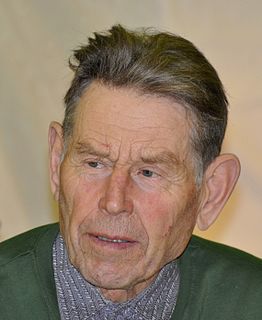A Quote by Jane Goodall
The cheapest and most efficient way of slowing down global warming is to protect and restore the forests, particularly the tropical forests
Related Quotes
We need healthy forests if we want to protect our climate. As the climate changes, forests become more vulnerable to insect outbreaks, droughts and wildfires. Simultaneously, when our forests are destroyed, their carbon is released back into the atmosphere, further impacting climate change. It's a horrifying one-two punch.
I want to do the right things - I want to plant trees, I want to make sure that the indigenous forests are protected because I know, whatever happens, these are the forests that contain biodiversity, these are the forests that help us retain water when it rains and keep our rivers flowing, these are the forests that many future generations will need.
My sense is that the most under-appreciated-and perhaps most under-researched-linkages between forests and food security are the roles that forest-based ecosystem services play in underpinning sustainable agricultural production. Forests regulate hydrological services including the quantity, quality, and timing of water available for irrigation. Forest-based bats and bees pollinate crops. Forests mitigate impacts of climate change and extreme weather events at the landscape scale.
We can drift along as though there were still a cold war, wasting hundreds of billions of dollars on weapons that will never be used, ignoring the problems of people in this country and around the world, being one of the worst environmental violators on earth, standing against any sort of viable programs to protect the world's forests or to cut down on acid rain or the global warming or ozone depletion. We can ignore human rights violations in other countries, or we can take these things on as true leaders ought to and accept the inspiring challenge of America for the future.
Virtually, Finnish woods are stripped so bare, so sold out and first and foremost, so long way off from genuine diverse natural forest, that the resources of language will not permit excessive words. Finnish forest economy has been compared to the ravaging of rain forests. Nevertheless, the noteworthy difference is that there is a half or two thirds left from rain forests, but from Finnish forests there is left - excluding arctic Lapland - 0,6 per cent.
A scientist with a poet's command of language, Cristina Eisenberg writes with precision and passion . . . takes her reader on a breathtaking, sometimes heartbreaking tour of the planet from the Gulf of Maine to the Amazonian rain forests, the tropical coral reefs to old growth forests of the Northwest as well as rivers, lakes, and wetlands. I found the wealth of information not only accessible but riveting . . . Eisenberg's powerful, beautifully written book . . . has the potential to open many people's eyes, minds, and hearts.



































